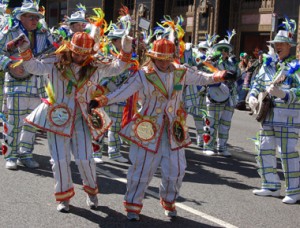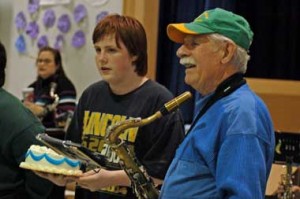Mummery has been a tradition in Philadelphia since the late 17th century—in celebration if not in name.
Mummers’ historians say that the Swedes extended their tradition of “Second Day Christmas,” when they visited friends, into New Year’s Day, throwing in some masquerades and noisy revelry (which later erupted into musket fire, bells and noisemakers.)
But mummery, which some say dates back to ancient Egypt, is also a 2,500-year-old tradition in Ulster, the northernmost counties in Ireland and Northern Ireland, so Irish immigrants to the US found a little bit of home every New Year’s Day. And just a little bit. In medieval Ireland, mumming meant plays, both religious and secular, often presented by local trade unions. Even today, when the “mummers” appear in Ireland, it’s to tell a story.
In Wexford, for example, mummers take to the streets to perform original plays (since none of the play scripts from yore have actually survived) about heroic figures from the Celtic past, like S. Patrick, Brian Boru, Wolfe Tone, and Owen Roe O’Neill. (Originally, the play’s characters were British figures such as St. George and Cromwell, but clearly that didn’t play nearly as well.) The plays are always in verse and swordplay is inevitably involved, as is death and rebirth.
Wexford mummers are so well known there’s even a song called “Wexford Mummers Song,” once recorded by Mary O’Hara, which tells the sad story of two maids of Shroden, in Derry Town, Patty Grey and Nancy Hogan, who “lead an awful life, an awful life and dreary.” It involves pig mutilation, death, and some cheery fa la las.
Like Philadelphia’s Mummers Parade, the Irish mumming street plays are performed as part of an annual competition. However, there are no banjos, feathers, sequins, and golden slippers. But there are disguises (mummers are also called guisers, as in “disguise”), usually intricate masks, much like the tall, conical masks worn by the chief entertainers of King Conor, legendary king of Ulster, at his palace in Eamhain Macha. In rural areas, like one small town in County Fermanagh, the mummers traditionally wear costumes of straw (giving rise to the name, “straw men”), largely because it’s cheap and available. Another parallel to the Philadelphia Mummers: In Ireland, it’s also traditional for men to dress up as women.
While the Irish didn’t bring mumming to Philadelphia, they certainly supported it. In his book, “The Irish in Philadelphia,” the late historian Dennis Clarke wrote that the Irish took immediately to the “generally uninhibited frolic” of the Mummer’s Parade.” Such displays were compatible with the Irish propensity for enjoyment. The folksy pantomime, the jingling music, and the ardent defiance of freezing winter weather made the Mummers famous, and the Irish were an eager part of the tradition.”
Mummers factoid: The word “mummer” is thought to stem from a German word meaning “disguised person.”


